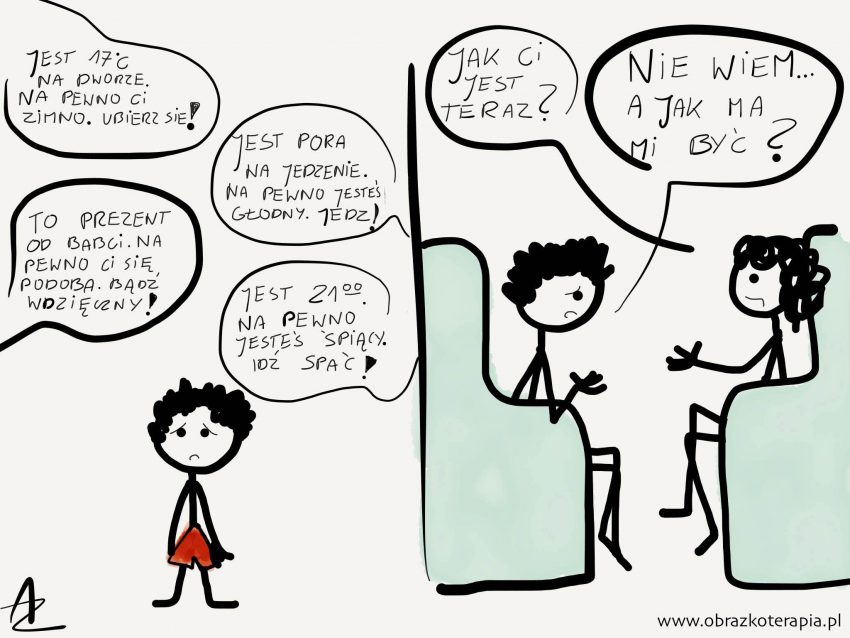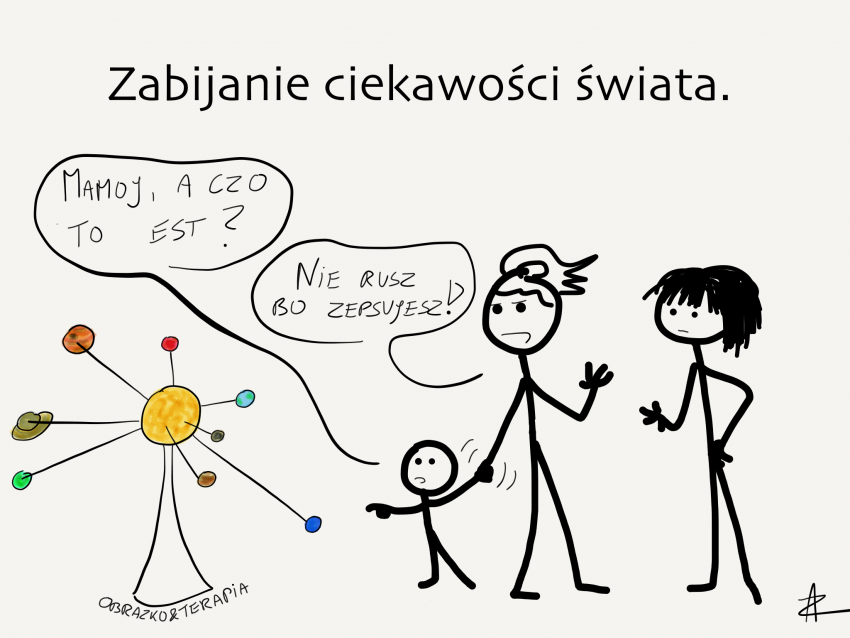
„Pozwalajmy dziecku na spontaniczność, ciekawość świata i zadawanie pytań”. Psycholog Agnieszka Zapart tłumaczy, jak mówić do dziecka, by wychować pewnego siebie człowieka
„Wirtuozeria w sprawie podcinania dzieciom skrzydeł ciągle jeszcze daleko przekracza poziom tej, która by miała je uskrzydlać. Na szczęście rodzice mają coraz większą świadomość i bardzo się to zmienia” – mówi psycholożka Agnieszka Zapart. Zobacz, jak mówić do dziecka, by wychować pewnego siebie człowieka.
Ewa Wojciechowska: Dużo mówi się o świadomym rodzicielstwie i odpowiednim zwracaniu się do dzieci. Dlaczego tak ważny jest to, jak mówimy do naszych dzieci?
Agnieszka Zapart: Sposób, w jaki mówimy do dzieci jest ważny, tak samo jak ogólnie sposób zwracania się do drugiego człowieka. W przypadku dzieci ma jednak znaczenie o tyle, że jako opiekunki/opiekunowie poprzez konkretny sposób, w jaki mówimy do dziecka, kształtujemy jego psychikę, obraz siebie, emocjonalność czy poczucie własnej wartości. Jeśli będziemy zwracać się do dzieci z szacunkiem i miłością, to wtedy będą miały poczucie, że są kochane i zasługują na szacunek. Gdy dostaną pogardę, zawstydzanie, wyśmianie czy poniżenie to według tego ukształtuje się ich postrzeganie siebie. Przy czym nie chodzi tu tylko o słowa, ale o cały przekaz, w którym to, co werbalne musi zgadzać się z tym, co niewerbalne. Bo można mówić komuś „kocham cię” bardzo oschle. A że wszyscy, ale dzieci szczególnie jesteśmy wyczuleni przede wszystkim na przekaz niewerbalny, jeśli chodzi o emocje, to nikt nie uwierzy w takie zimne „kocham cię”.

Co mówić do dziecka, gdy jest niegrzeczne?
Ja może zacznę od tego, że nie ma dla mnie czegoś takiego jak niegrzeczne dziecko. Tak wiem, że to kontrowersyjne, ale kiedy się nad tym głębiej zastanowimy, to o jakich dzieciach mówi się, że są niegrzeczne? O takich, które nie robią tego, czego chcemy, zawsze, kiedy tego chcemy, prawda? Ktoś powie w tym momencie: a to dzieci nie mają się słuchać rodziców? Nie mają być posłuszne? Robić, co się im każe? Na tak postawione pytania odniosłabym się do podstaw wychowania w ogóle i do fundamentalnego dla mnie pytania – kogo chcę wychować? Czy ma to być człowiek posłuszny, niepotrafiący wyrazić własnego zdania albo zadbać o swoje granice, który będzie potrzebował silnej jednostki za partnera/partnerkę, by się jej podporządkowywać? Czy może chcę, aby moje dziecko wyrosło na kogoś, kto potrafi budować relacje oparte na szacunku, empatii, ale też świadomości, że każdy ma prawo do swojego zdania i odrębności?
Oczywiście uprzedzając wątpliwości, które często się pojawiają przy takim patrzeniu na sprawę, nie uważam, że dziecko, zwłaszcza małe, należy puścić samopas i jak nie posłucha i wbiegnie na ulicę to znaczy, że tak miało być, bo uszanowałam jego autonomię. Uważam, że moim obowiązkiem, jako matki jest dbać o bezpieczeństwo dziecka tak samo, jak budować z nim relację opartą na wzajemnym szacunku, szczerości i miłości.

W takim razie jak mówić do dzieci, żeby słuchały?
To trudne pytanie, jeśli jedynym celem komunikacji ma być wymuszanie posłuszeństwa. Nikt z nas, ani dorosły, ani dziecko nie lubi, gdy się do niego zwraca z takim założeniem. Jeśli natomiast mamy na myśli bycie usłyszanym przez dziecko to zupełnie inny kawałek.
Przede wszystkim warto wziąć pod uwagę, że dzieciom z racji dopiero rozwijającego się układu nerwowego nie jest tak łatwo skupiać się czy przerzucać uwagę z tego, co robią, jak dorosłym. Bardzo trudno im też słuchać, gdy są zdenerwowane. Jeśli tak jest, to przede wszystkim warto spokojnie pozyskać jego uwagę albo pomóc mu się najpierw uspokoić, a potem dopiero podejmować rozmowę. Warto mówić szczerze i z szacunkiem oraz formułować komunikaty „Ja”. Tylko nie w taki sposób, że „ja uważam, że Ty”, tylko „ja czuję się/myślę to i to, kiedy Ty robisz to i to. Gdy tak się dzieje, potrzebuję tego i tego”. To w skrócie przepis na porozumienie bez przemocy, stworzone przez Rosenberg, które jest szeroko stosowane nie tylko w pedagogice, ale także w dyplomacji.

Gdy dziecko płacze, przytulać czy nie?
Jeśli dziecko tego potrzebuje, to oczywiście, że tak! Czasem bywa, że dziecko jest zezłoszczone i zrozpaczone i nie chce się przytulać, wtedy lepiej zaczekać. Ale jeśli płacze i chce przytulenia to naprawdę nie znajduję nawet pół powodu, by tego nie robić, zwłaszcza, że to bardzo kojące doświadczenie.
Można znaleźć wiele przykładów na to, czego nie powinniśmy mówić dzieciom. Ale czy są słowa, których powinniśmy często używać?
Nie wiem, czy są jakieś powinności w tej sprawie, bo nawet najlepsze słowa powtarzane codziennie, jeśli nie będą autentyczne – mówione z wewnętrznym przekonaniem – nie mają żadnego znaczenia. Także jeśli mamy wewnętrzne przekonanie co do tego, że kochamy swoje dziecko i jest ono dla nas ważne, to mówmy mu to. Czasem rodzicom wydaje się, że przecież to oczywiste. Nic nie jest oczywiste i tak jak nie chcielibyśmy musieć domyślać się czy partner/ka nas kocha, tak dzieci też nie chcą się tego domyślać. Chcą to czuć i wiedzieć.

Jak mówić do dziecka, by nie zniszczyć w nim dziecięcej radości i wychować na pewnego siebie człowieka?
Nie tyle mówić, co raczej robić. Pozwalać na spontaniczność i ciekawość świata. Na zadawanie pytań i udzielać na nie odpowiedzi. Zachęcać do odkrywania, dzielić z dzieckiem jego radości i bawić się. Pewność siebie, czyli poczucie, że jestem wartościowym, dobrym człowiekiem, kształtuje się w relacji. Jeśli opiekun/ka odnosi się z miłością i szacunkiem, wspiera, a nie obraża, poniża nie jest agresywna/y albo obojętna/y, to wtedy tworzy się dobry klimat, w którym pewność siebie małego człowieka może wzrastać.

Jakimi słowami „podcina się dzieciom skrzydła”?
Etykietowanie, „Ty….(wpisz dowolną obelgę)”. „Tobie nigdy się nie uda”, ale też „Udało się, to miałeś/aś szczęście”. „Zostaw, to nie dla ciebie”, „Zostaw, bo zrobisz sobie krzywdę”, „Zostaw, bo zepsujesz”, „Powinnaś/eś robić to tak…(wpisz szereg rad rodzica, który zawsze wie lepiej)”. Mam wrażenie, że nie sposób wymienić wszystkich, bo niestety wirtuozeria w sprawie podcinania dzieciom skrzydeł ciągle jeszcze daleko przekracza poziom tej, która by miała je uskrzydlać. Na szczęście rodzice mają coraz większą świadomość i bardzo się to zmienia.

Na zakończenie: najczęstsze błędy, jakie popełniają rodzice w komunikacji z dzieckiem to…?
O wielu już powiedziałam, ale chyba takie najczęstsze to mówienie do dzieci, kiedy fizycznie nie są w stanie nic usłyszeć ani zrozumieć, bo są tak zdenerwowane albo rozbawione i najpierw potrzebują uspokojenia, a potem rozmowy. A także zapominanie o tym, że dziecko to mały człowiek i należy mu się takie same uważne i empatyczne traktowanie jak dorosłemu, a jednocześnie, że to opiekun/ka jest początkowo odpowiedzialny za kształt relacji z dzieckiem, ponieważ to on/a ją modeluje.
Agnieszka Zapart – psycholożka z wykształcenia, psychoterapeutka z zawodu i rysowniczka z pasji. Jest twórczynią „Kreseczki” – bohaterki „Obrazkoterapii”. Wspiera w trudnościach i inspiruje do rozwoju. Od 2014 roku prowadzi bloga psychologicznego – Obrazkoterapia.








































